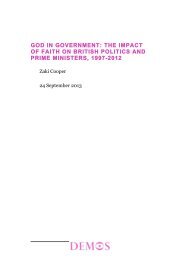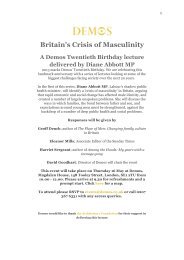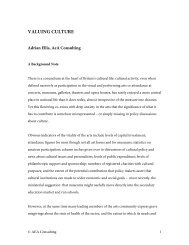Cultural diplomacy - Demos
Cultural diplomacy - Demos
Cultural diplomacy - Demos
Create successful ePaper yourself
Turn your PDF publications into a flip-book with our unique Google optimized e-Paper software.
<strong>Cultural</strong> Diplomacy<br />
ambassadors, there was no high-level UK government presence, a<br />
missed opportunity at a time when engagement with the region has<br />
never been more important. Conversely, there are few instances of<br />
cultural professionals (other than those related to science) having a<br />
seat at the trade and policy table, the inclusion of the director of the<br />
British Museum as a member of the China Task Force being a notable<br />
exception. Government departments should look for more<br />
opportunities to engage leading cultural professionals in the<br />
policy-making process, through their involvement in policy teams<br />
and commissions.<br />
The emerging powers are fast realising the importance of their own<br />
cultures and using them as one of their central tools of outward<br />
projection. Our government will take care of official ties, but if the<br />
foundations of broader cultural relationships are not in place, these<br />
will be fragile, especially as public opinion becomes ever more<br />
suspicious of government activity. We cannot afford to be complacent<br />
and expect our relative position of cultural strength to take care of<br />
itself. It is vital that the whole of government, in partnership with<br />
others including cultural institutions, works actively and energetically<br />
to maintain and strengthen our cultural standing.<br />
Market forces often drive the international work of UK<br />
cultural institutions<br />
Much of the work that the UK’s cultural institutions do overseas is<br />
commercially driven. For example, not only has the NHM been<br />
touring exhibitions overseas commercially for 17 years, it has also<br />
provided consulting services to the European Union and the national<br />
museums of Kenya, Qatar and Dubai. The BL generates income from<br />
its publications and image supply, and the BM has advisory contracts<br />
in Kenya (funded by DCMS) and Qatar. These kinds of opportunities<br />
are particularly prevalent in the Gulf States, which see cultural<br />
tourism as a vital future component of their economies, and in<br />
Eastern Europe, where nations want to establish their identities, to<br />
restore their heritage, and to modernise their displays.<br />
Touring exhibitions are a big business in their own right. The V&A<br />
46 <strong>Demos</strong>






